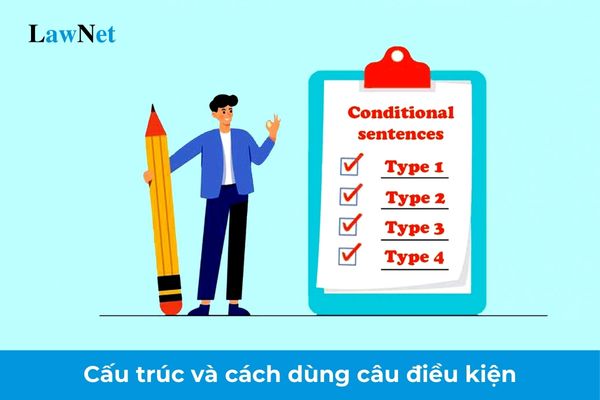Vietnam: What are the structure and use methods of conditional sentences in the English curriculum? Give examples
What are the structure and use methods of conditional sentences in the English curriculum?
Conditional sentences are one of the important structures in the English curriculum, used to express assumptions about situations that may or may not occur in reality. Mastering the structure and use methods of conditional sentences will help students excel in this grammar form in the English subject.
Type 0 Conditional Sentences
- Describes situations that are always true or always happen based on an assumption.
Structure: If + S + V(s,es), S + V(s,es)
Example: If you heat water to 100 degrees Celsius, it changes into steam.
Type 1 Conditional Sentences
- Type 1 conditional sentences are used to describe events that are likely to happen based on a certain assumption.
- A conditional sentence consists of two parts: one part sets the condition of the action and the other part states the result of that action, known as the conditional clause (usually starting with if) and the main clause (containing will/ would).
- The conditional clause always follows the word if.
Structure: If + S + V(s,es), S + Will/Can/shall…… + V
Example: If the weather is good, we can go for a picnic.
Note:
- When the “If” clause is placed before the main clause, a comma “,” is used.
- Modal verbs (can, may, should, must,…) can be used to replace “will” in the main clause.
- Sometimes, the present simple tense can be used in the main clause when describing a rule, an obvious truth, or a condition that is always true.
Type 2 Conditional Sentences
- Type 2 conditional sentences describe an assumption less likely to occur in the present, leading to a result that is also less likely to occur.
Structure: If + S + V2/ Ved, S +would/ Could/ Should…+ V
To be: were/weren’t
Example: If I chose to study medicine, my family would be proud of me.
Note:
- When the “If” clause is placed before the main clause, a comma “,” is used.
- Modal verbs (could, might, had to,…) can be used to replace “would” in the main clause.
- Sometimes, the present simple tense can be used in the main clause when describing a rule, an obvious truth, or a condition that is always true.
Type 3 Conditional Sentences
- Describes an assumption that has no possibility of occurring and the corresponding result from this assumption.
Structure: If + S + Had + V(pp)/Ved, S + would/ could…+ have + V(pp)/ Ved
Example: If you had not helped me, I wouldn’t have been able to finish the work.
Inverted Conditional Sentences
- Inverted Type 1 Conditional: Should + S + (not) + V, S + will +V
Example: If I meet him tomorrow, I will give him this letter.
= Should I meet him tomorrow, I will give him this letter
- Inverted Type 2 Conditional: Were + S + O/ (not) + to + V, S + would + V
Example: If I were you, I would buy this house.
= Were I you, I would buy this house
If I knew his address, I'd give it to you.
= Were I to know his address, I’d give it to you.
- Inverted Type 3 Conditional: Had + S + (not) + Ved/ V3, S + would have + Ved/ V3
Example: If he had driven carefully, the accident wouldn't have happened.
= Had he driven carefully, the accident wouldn't have happened.
Note: The information on the structure and use methods of conditional sentences in the English curriculum is for reference only!

What are the structure and use methods of conditional sentences in the English curriculum? Give examples (Image from the Internet)
What are the objectives of the English curriculum for 9th-grade students in Vietnam?
Under the General Education Program for the English subject issued with Circular 32/2018/TT-BGDDT, the objectives of the English curriculum for 9th-grade students are as follows:
- Use English as a tool for communication through the four skills of listening, speaking, reading, and writing to meet basic and direct communication needs in close and everyday situations.
- Have basic knowledge of English, including phonetics, vocabulary, and grammar; through English, acquire general knowledge about the countries, people, and cultures of English-speaking nations and other countries around the world, while also understanding and taking pride in the values of one's national culture.
- Develop a positive attitude towards the subject and learning English, initially knowing how to use English to explore other subjects within the general education program.
- Form and apply different learning methods and strategies to enhance English communication skills both inside and outside the classroom, manage study time, and establish self-study habits.
Was the 2018 General Education Program applied to 9th-grade students in Vietnam?
Under Article 2 of Circular 32/2018/TT-BGDDT:
The general education program applies to:
- From the academic year 2020-2021 for grade 1.
- From the academic year 2021-2022 for grades 2 and 6.
- From the academic year 2022-2023 for grades 3, 7, and 10.
- From the academic year 2023-2024 for grades 4, 8, and 11.
- From the academic year 2024-2025 for grades 5, 9, and 12.
Thus, according to the prescribed roadmap, in the 2024-2025 academic year, the 2018 General Education Program was applied to 9th-grade students in Vietnam.

